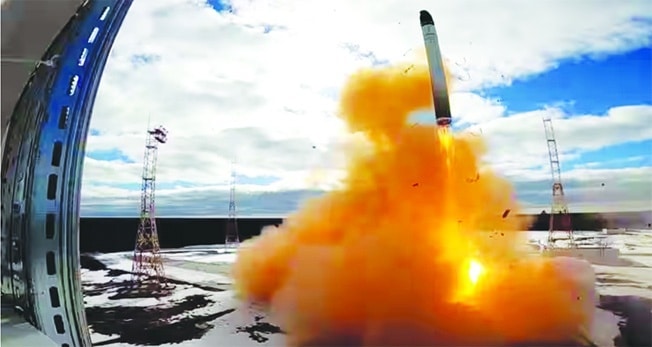Russian lawmakers were given 10 days on Monday to study how best to revoke Moscow’s ratification of a landmark treaty banning nuclear tests, after President Vladimir Putin held out the possibility of resuming such testing.
Russia’s envoy to the Comprehensive Nuclear Test Ban Treaty Organization (CTBTO) said on Friday that Moscow would revoke its ratification of the pact, a move that Washington denounced as endangering “the global norm” against nuclear test blasts.
Revoking Russia’s ratification is viewed by some Western security analysts as a pointed reminder from Moscow – at a time when it is locked in a standoff with the West over Ukraine – that it possesses the world’s largest nuclear arsenal.
A nuclear test by Russia, designed to signal resolve and evoke fear, could encourage others such as the United States or China to follow suit, starting a new nuclear arms race between the big powers, which stopped nuclear testing in the years after the Soviet Union’s collapse in 1991.
Last Thursday, Putin said Russia’s nuclear doctrine – the conditions in which he would press the nuclear button – did not need updating.
However, Putin said Russia could look at revoking ratification of the Comprehensive Nuclear Test Ban Treaty (CTBT)to bring it into line with the United States, which has signed but not ratified the document.
Russia’s top lawmaker, Vyacheslav Volodindiscussed the matter with parliamentary leaders on Monday and said such a move would be in the country’s national interest.
He and the other parliament bosses gave lawmakers on the International Affairs Committee 10 days – until Oct. 18 – to study the option of revoking ratification, according to a statement from the State Duma, the lower house of parliament.
NUCLEAR TESTING
The Ukraine war has raised tension between Moscow and Washington to its highest since the Cuban Missile Crisis of 1962, just as China seeks to bolster its nuclear arsenal to match its status as an emerging superpower.
By revoking the ratification, Russia is sending the United States a warning that Moscow can fundamentally change the assumptions of post-Cold War nuclear planning.
Signed by 187 countries and ratified by 178, the CTBT cannot enter into force until eight specific holdouts have signed and ratified it.
The United States, China, Egypt, Iran, and Israel have signed but not ratified it. India, North Korea and Pakistan have not signed.
The Soviet Union last tested in 1990 and the United States in 1992. Russia, which inherited most of the Soviet nuclear arsenal, has never done so. But signs have emerged that testing could resume.
Last month CNN said satellite images showed growing activity at nuclear test sites in Russia, China and the United States. In 2020, the Washington Post said the then-Trump administration had discussed whether to hold a nuclear test.
Ten nuclear tests have taken place since the CTBT. India and Pakistan conducted two each in 1998, while North Korea held tests in 2006, 2009, 2013, 2016 (twice) and 2017, according to the United Nations.







Click here to change your cookie preferences